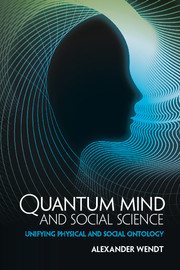Book contents
- Frontmatter
- Dedication
- Epigraph
- Contents
- Acknowledgments
- 1 Preface to a quantum social science
- Part I Quantum theory and its interpretation
- Part II Quantum consciousness and life
- Part III A quantum model of man
- Part IV Language, light, and other minds
- Part V The agent-structure problem redux
- Conclusion
- Bibliography
- Index
Part III - A quantum model of man
Published online by Cambridge University Press: 05 May 2015
- Frontmatter
- Dedication
- Epigraph
- Contents
- Acknowledgments
- 1 Preface to a quantum social science
- Part I Quantum theory and its interpretation
- Part II Quantum consciousness and life
- Part III A quantum model of man
- Part IV Language, light, and other minds
- Part V The agent-structure problem redux
- Conclusion
- Bibliography
- Index
Summary
Introduction
The central claim of this book is that all intentional phenomena are quantum mechanical. That goes both for the private thoughts inside our heads and for public or collective intentions like norms, culture, and language, which we might generically call institutions. I suggested in Chapter 1 that by virtue of their dependence on consciousness, a classical, materialist ontology cannot explain these phenomena, and as such from that perspective they must be epiphenomenal or illusions. In the rest of this book I show that a quantum, panpsychist ontology can provide a physical basis for what we all know to be true, which is that both private and collective intentions are part of the natural order.
The elementary parts of social ontology are human beings in their biological individuality, which in this Part I consider in abstraction from their lived social contexts. By taking humans out of their natural habitat I aim to focus attention on what we bring to the social table simply by virtue of being organisms of a certain kind. The abstract individual is a common enough starting point in classical social theory (think Hobbes and the state of nature). However, it might seem an odd place to begin a quantum social theory, given the holism of quantum phenomena, both “all the way down” in having no elementary parts, and “all the way across” in universal non-locality. What look like separate organisms are just local decoherence effects of quantum fields; everything really is related to everything else. In that light the abstract individual appears not just as an abstraction, but as positively occluding what “the individual” really is.
However, there is a difference between what is true of a universal ontology and what is practically relevant to specifically socialontologies, which are constrained by the properties of their constituent organisms. Unlike some organisms, humans live in highly interdependent societies, and most of what is interesting about us is socially constituted as well.
Information
- Type
- Chapter
- Information
- Quantum Mind and Social ScienceUnifying Physical and Social Ontology, pp. 149 - 153Publisher: Cambridge University PressPrint publication year: 2015
